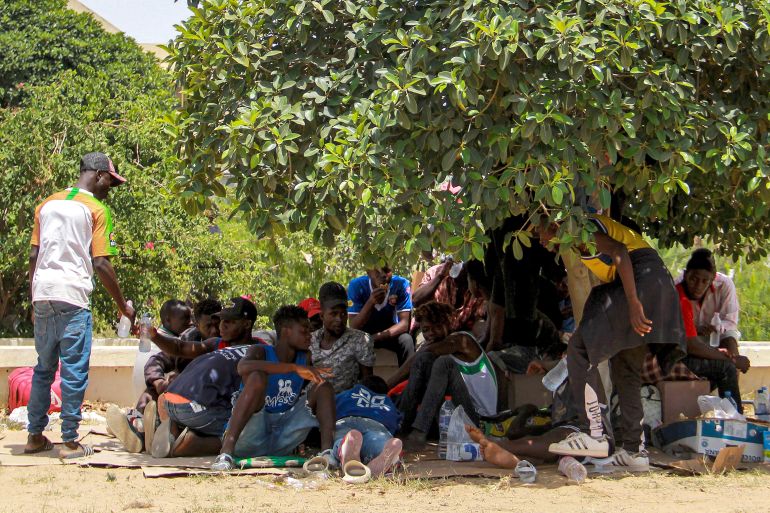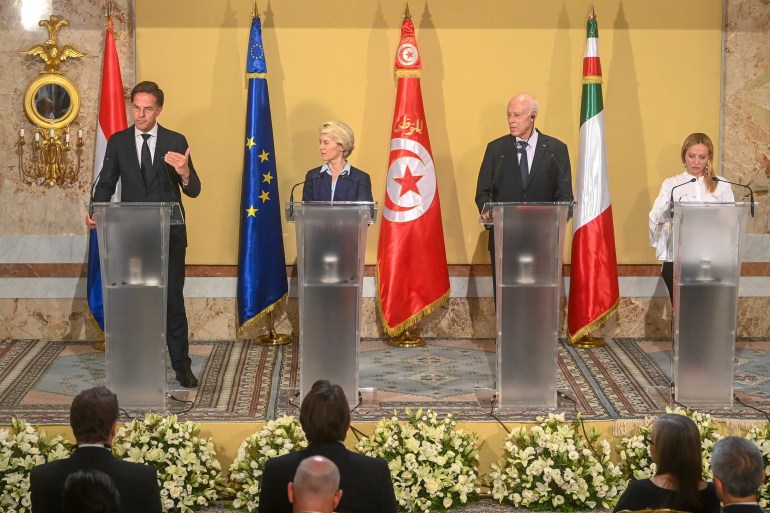What is behind the EU-Tunisia deal on migration?
The number of refugees departing from Tunisia and trying to reach Europe has increased significantly in recent months.

European Union leaders and the Tunisian government have signed what they call a “strategic partnership” deal that aims to combat undocumented immigration and boost economic ties between the bloc and the North African country.
European Commission President Ursula von der Leyen, Dutch Prime Minister Mark Rutte and Italian Prime Minister Giorgia Meloni held renewed talks on Sunday with Tunisian President Kais Saied.
Keep reading
list of 4 itemsDeath toll in Greece refugee boat tragedy soars to 78
Black refugees stranded in Tunisian desert witness death, misery
Tunisia and EU finalise deal on migration
Tunisia lies on a major route for refugees travelling to Europe.
The number of refugees departing from Tunisia and trying to reach Europe has significantly increased in recent months.
What does the deal consist of?
The EU commission chief said the bloc would allocate 100 million euros ($112m) to Tunisia to help it combat undocumented immigration.
The deal is also said to promote macroeconomic stability, trade and investment, the green energy transition and legal immigration.
Von der Leyen said the agreement aims to “invest in shared prosperity”.
“We need an effective cooperation more than ever” on migration, she said, and against “networks of smugglers and traffickers”.
The aid also includes a 10-million-euro ($11m) programme to boost exchanges of students and 65 million euros ($73m) to modernise schools.
Yasmine Akrimi, a researcher at the Brussels International Center, told Al Jazeera that the EU has been trying to achieve this deal for years and turn North African countries into a “disembark platform”.
“Italy wants to consider Tunisia as what they call a safe third country, meaning that everyone who passes through Tunisia can eventually be relocated back to Tunisia,” she said.

Why has Tunisia agreed to the deal?
Tunisia is struggling with crippling inflation and nearing a major debt crisis.
In June, von der Leyen offered Tunisia 105 million euros ($115m) to curb undocumented immigration and 150 million euros ($168m) in immediate support, including a long-term loan of 900 million euros ($1.01bn).
But that loan would be contingent on approving a loan from the International Monetary Fund (IMF).
Talks on the IMF loan have been stalled since October after Saied rejected the terms, including subsidy cuts and a reduction in the public wage bill.
On Sunday, he rejected the IMF demands to lift subsidies on basic products and services and the restructuring of 100 state-owned firms.
How high are migration levels?
According to the European border agency, Frontex, the Central Mediterranean route has been the most active path used by refugees to reach the EU this year with “nearly 66,000 detections reported by national authorities in the first six months of 2023”.
“This route accounts for one of every two irregular entries into the EU in this year,” it said.
The Central Mediterranean route connects North African countries – including Tunisia, Algeria, Egypt and Libya – to Italy and Malta.
More than 400 refugees drowned in the Central Mediterranean in the first three months of the year, making it the deadliest quarter since 2017 on the world’s most dangerous refugee crossing, according to the United Nations.
In recent months, thousands of African refugees have flocked to the city of Sfax in Tunisia despite Saied claims the rise in sub-Saharan migration was changing Tunisia’s racial makeup.
His comments sparked racist attacks and forced hundreds of people to flee Sfax.
What has been the reaction to the agreement?
Rights bodies and Mediterranean rescue missions have condemned the deal, calling it “dangerous”, and have questioned how it will protect the vulnerable.
Eve Geddie, Amnesty International’s advocacy director in Europe, said the decision shows that no lessons have been learned from similar agreements.
“This ill-judged agreement, signed despite mounting evidence of serious human rights abuses by authorities, will result in a dangerous expansion of already failed migration policies and signals EU acceptance of increasingly repressive behaviour by Tunisia’s president and government,” she said in a statement following the signing.
“By focusing their policies and funding on containment and on outsourcing of border control rather than ensuring safe and legal routes for those trying to cross borders safely, EU leaders are once again embarking on failed policies that are based on callous disregard for basic human rights standards,” she added.
The ill-judged agreement, signed yesterday by the EU and Tunisa comes despite mounting evidence of serious human rights abuses by authorities.
It will result in a dangerous expansion of already failed migration policies @amnesty https://t.co/xYu2emfA8G
— amnestypress (@amnestypress) July 17, 2023
Alarm Phone, which helps rescue refugees trying to cross the Mediterranean into the EU, condemned the EU for signing the agreement “in full knowledge of the atrocities that the Tunisian government is carrying out”.
🚩Alarm Phone Statement!
While Tunisian security forces continue to force people into the desert, #TeamEurope agreed to a new migration deal, in full knowledge of the atrocities that the Tunisian government is carrying out. https://t.co/PlxZ9DPaZh
— Alarm Phone (@alarm_phone) July 17, 2023
Resqship, another rescue NGO, said that by agreeing to the deal, Tunisia will become “another EU gatekeeper violently preventing people from fleeing”.
“EU-isolationism has won again. But with #Tunisia, the EU is giving massive amounts of money to a country that will thereby advance its own authoritarianism,” it said in a tweet.
(1/2) #Tunisia is to become another EU gatekeeper violently preventing people from fleeing. To close this multi-million dollar deal with a country that hunts down Black ppl, simply abandons them in the desert & arrests them en masse, is a crime & betrayal of people & humanity. pic.twitter.com/Qz5TJSubsp
— RESQSHIP (@resqship_int) July 17, 2023
Michela Pugliese, a researcher at the Euro-Mediterranean Monitor, said the deal legitimises Said’s “increasingly authoritarian and racist grip”.
Last week Tunisia carried out arbitrary arrests and collective expulsions of hundreds of Black Africans. Now the EU flaunts its new MoU with it, offering financial and political support in exchange of migration containment. What about racism and clear violations of human rights?
— Michela Pugliese (@MichelaPuglies5) July 17, 2023
Vincent Cochetel, special envoy for the Western and Central Mediterranean migration situation for the UN High Commissioner for Refugees, raised concerns over the registration of non-Tunisian refugees.
“The statement does not include the words refugee, asylum, victims of trafficking, what are the commitments for those in need of protection?” he wrote on Twitter.
The text of the agreement Tunisia-EU confirms my concerns. Identification/registration seems just in relation to returns from Tunisia, no reference to legal pathways for some non-Tunisians. https://t.co/vj0iC6keGv
— vincent cochetel (@cochetel) July 17, 2023